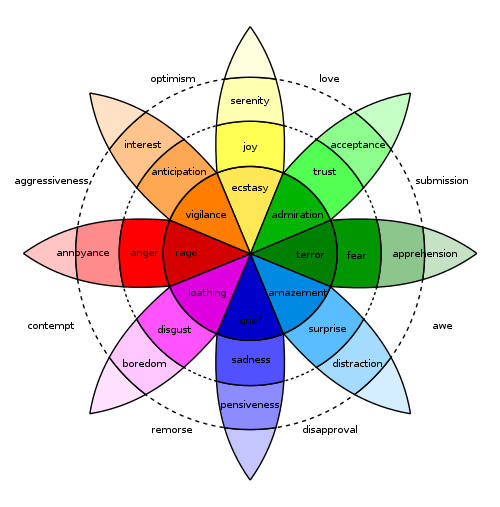Gratitude
Gratitude, thankfulness, or gratefulness, from the Latin word gratus ‘pleasing, thankful’,[1] is a feeling of appreciation felt by and/or similar positive response shown by the recipient of kindness[2][3][4], gifts, help, favors, or other types of generosity[5], towards the giver of such gifts.[6][7]

The experience of gratitude has historically been a focus of several world religions.[8] It has also been a topic of interest to ancient, medieval and modern philosophers, and continues to engage contemporary philosophers.[9]
The systematic study of gratitude within psychology only began around the year 2000, possibly because psychology traditionally focused more on understanding distress than on understanding positive emotions. The study of gratitude within psychology has included the understanding of the short term experience of the emotion of gratitude (state gratitude), individual differences in how frequently people feel gratitude (trait gratitude), and the relationship between these two aspects, as well as the therapeutic benefits of gratitude.[10][11]
Comparison with indebtedness
Gratitude is not the same as indebtedness. While both emotions occur following help, indebtedness occurs when a person perceives that they are under an obligation to make some repayment of compensation for the aid.[12] The emotions lead to different actions; indebtedness can motivate the recipient of the aid to avoid the person who has helped them, whereas gratitude can motivate the recipient to seek out their benefactor and to improve their relationship with them.[13][14]
As a motivator of behavior
Gratitude may also serve to reinforce future prosocial behavior in benefactors. For example, one experiment found that customers of a jewelry store who were called and thanked showed a subsequent 70% increase in purchases. In comparison, customers who were called and told about a sale showed only a 30% increase in purchases, and customers who were not called at all did not show an increase.[15] In another study, regular patrons of a restaurant gave bigger tips when servers wrote "Thank you" on their checks.[16]
Religious approaches
The link between spirituality and gratitude has recently become a popular subject of study. While these two characteristics are certainly not dependent on each other, studies have found that spirituality is capable of enhancing a person’s ability to be grateful and therefore, those who regularly attend religious services or engage in religious activities are more likely to have a greater sense of gratitude in all areas of life.[17][18] Gratitude is viewed as a prized human propensity in the Christian, Buddhist, Muslim, Jewish, Baha'i, and Hindu traditions.[8] Worship with gratitude to God[19] is a common theme in such religions and therefore, the concept of gratitude permeates religious texts, teachings[20], and traditions. For this reason, it is one of the most common emotions that religions aim to provoke and maintain in followers and is regarded as a universal religious sentiment.[21]
Jewish conceptions
In Judaism, gratitude is an essential part of the act of worship and a part of every aspect of a worshiper’s life. According to the Hebrew worldview, all things come from God and because of this, gratitude is extremely important to the followers of Judaism. The Hebrew Scriptures are filled with the idea of gratitude. Two examples included in the psalms are "O Lord my God, I will give thanks to you forever," and "I will give thanks to the Lord with my whole heart" (Ps. 30:12; Ps. 9:1). The Jewish prayers also often incorporate gratitude beginning with the Shema, where the worshiper states that out of gratitude, "You shall love the Eternal, your God, with all your heart, with all your soul, and with all your might" (Deut. 6:5). One of the crucial blessings in the central thrice-daily prayer, the "Amidah", is called "Modim" – "We give thanks to You"; this is also the only blessing which is recited by the congregation together with the leader during their repetition of the Amidah. The concluding prayer, the Alenu, also speaks of gratitude by thanking God for the particular destiny of the Jewish people. Along with these prayers, faithful worshipers recite more than one hundred blessings called berachot throughout the day.[8] In Judaism there is also a major emphasis on gratitude for acts of human kindness and goodness.
Christian conceptions

Gratitude has been said to mold and shape the entire Christian life. Martin Luther referred to gratitude as "The basic Christian attitude" and today it is still referred to as "the heart of the gospel."[21] Christians are strongly encouraged to praise and give gratitude to their creator. In Christian gratitude, God is seen as the selfless giver of all good things and because of this, there is a deep sense of gratefulness which enables Christians to share a common bond, shaping all aspects of a follower’s life. Gratitude in Christianity is an acknowledgment of God’s generosity that inspires Christians to shape their own thoughts and actions around such ideals.[8] Instead of simply a sentimental feeling, Christian gratitude is regarded as a virtue that shapes not only emotions and thoughts but also actions and deeds.[21][22] Jonathan Edwards writes in his A Treatise Concerning Religious Affections that gratitude and thankfulness toward God are among the signs of true religion. Because of this interpretation, modern measures of religious spirituality include assessments of thankfulness and gratitude towards God. Allport (1950) suggested that mature religious intentions come from feelings of profound gratitude and Edwards (1746/1959) claimed that the "affection" of gratitude is one of the most accurate ways of finding the presence of God in a person’s life. In a study done by Samuels and Lester (1985) it was contended that in a small sample of Catholic nuns and priests, out of 50 emotions, love and gratitude were the most experienced emotion towards God.[8]
In the Orthodox, Catholic, Lutheran and Anglican churches, the most important rite is called the Eucharist; the name derives from the Greek word eucharistia for thanksgiving.[23]
Islamic conceptions
The Islamic sacred text, The Quran, is filled with the idea of gratitude. Islam encourages its followers to be grateful and express thanks to God in all circumstances. Islamic teaching emphasizes the idea that those who are grateful will be rewarded with more. A traditional Islamic saying states that, "The first who will be summoned to paradise are those who have praised God in every circumstance"[24] In the Quran it is also stated in Sura 14 that those who are grateful will be given more by God. Many practices of the Islamic faith also encourage gratitude. The Pillar of Islam calling for daily prayer encourages believers to pray to God five times a day in order to thank him for his goodness. The pillar of fasting during the month of Ramadan is for the purpose of putting the believer in a state of gratitude.[8]
Individual differences
Much of the recent work psychological research into gratitude has focused on the nature of individual difference in gratitude, and the consequences of being a more or less grateful person.[24] Three scales have been developed to measure individual differences in gratitude, each of which assesses somewhat different conceptions.[25] The GQ6[26] measures individual differences in how frequently and intensely people feel gratitude. The Appreciation Scale[27] measures 8 different aspects of gratitude: appreciation of people, possessions, the present moment, rituals, feeling of awe, social comparisons, existential concerns, and behaviour which expresses gratitude. The GRAT[28] assesses gratitude towards other people, gratitude towards the world in general, and a lack of resentment for what you do not have. A recent study showed that each of these scales are actually all measuring the same way of approaching life; this suggests that individual differences in gratitude include all of these components.[25]
Empirical findings
Association with well-being
A large body of work in the early 21st century has suggested that people who are more grateful have higher levels of subjective well-being. Grateful people are happier, less depressed, less stressed[29], and more satisfied with their lives and social relationships.[26][30][31] Specifically, in terms of depression, gratitude may serve as a buffer by enhancing the coding and retrievability of positive experiences.[32] Grateful people also have higher levels of control of their environments, personal growth, purpose in life, and self acceptance.[33] Grateful people have more positive ways of coping with the difficulties they experience in life, being more likely to seek support from other people, reinterpret and grow from experiences, and spend more time planning how to deal with the problem.[34] Grateful people also have less negative coping strategies, being less likely to try to avoid the problem, deny there is a problem, blame themselves, or cope through substance use.[34] Grateful people sleep better, and this seems to be because they think less negative and more positive thoughts just before going to sleep.[35] Numerous studies suggest that grateful people are more likely to have higher levels of happiness and lower levels of stress and depression.[24][36][37] In addition, a person's gratitude can protect the relationship satisfaction of their partner.[38]
While many emotions and personality traits are important to well-being and mental health, there is evidence that gratitude may be uniquely important. First, a longitudinal study showed that people who were more grateful coped better with a life transition. Specifically, people who were more grateful before the transition were less stressed, less depressed, and more satisfied with their relationships three months later.[39] Second, two recent studies have suggested that gratitude may have a unique relationship with well-being, and can explain aspects of well-being that other personality traits cannot. Both studies showed that gratitude was able to explain more well-being than the Big Five and 30 of the most commonly studied personality traits.[30][33]
Gratitude has also been shown to foster physical health.[40] For example, in one study, if teens wrote letters of gratitude to other people over a month, they were more inclined to eat healthier food.[40] Arguably, when people feel grateful, they feel an obligation to reciprocate the efforts of other individuals. Therefore, rather than indulge and sacrifice their own health—a behaviour that would dismiss the efforts that other individuals invested in them—they may feel compelled to live a healthier life. Alternatively, gratitude tends to elicit positive emotions, and these positive emotions tend to divert attention to favourable possibilities in the future. Individuals become more inclined to engage in behaviours that could benefit this future, such as healthy eating.[40]
Relationship to altruism
Gratitude has also been shown to improve a person’s altruistic tendencies. One study conducted by David DeSteno and Monica Bartlett (2010) found that gratitude is correlated with economic generosity. In this study, using an economic game, increased gratitude was shown to directly mediate increased monetary giving. From these results, this study shows that grateful people are more likely to sacrifice individual gains for communal profit (DeSteno & Bartlett, 2010). A study conducted by McCullough, Emmons, & Tsang, (2002) found similar correlations between gratitude and empathy, generosity, and helpfulness towards the creation of a social reciprocity even with strangers that is beneficial to the individuals in the short and in the middle terms.[41][42]
Psychological interventions
Given that gratitude appears to be a strong determinant of people's well-being, several psychological interventions have been developed to increase gratitude.[24][43] For example, Watkins and colleagues[44] had participants test a number of different gratitude exercises, such as thinking about a living person for whom they are grateful, writing about someone for whom they are grateful, and writing a letter to deliver to someone for whom they are grateful. Participants in the control condition were asked to describe their living room. Participants who engaged in a gratitude exercise showed increases in their experiences of positive emotion immediately after the exercise, and this effect was strongest for participants who were asked to think about a person for whom they are grateful. Participants who had grateful personalities to begin with showed the greatest benefit from these gratitude exercises. In another study concerning gratitude, participants were randomly assigned to one of six therapeutic intervention conditions designed to improve the participants' overall quality of life (Seligman et al., 2005).[45] Out of these conditions, it was found that the biggest short-term effects came from a "gratitude visit" where participants wrote and delivered a letter of gratitude to someone in their life. This condition showed a rise in happiness scores by 10 percent and a significant fall in depression scores, results which lasted up to one month after the visit. Out of the six conditions, the longest lasting effects were associated with the act of writing "gratitude journals" where participants were asked to write down three things they were grateful for every day. These participants’ happiness scores also increased and continued to increase each time they were tested periodically after the experiment. In fact, the greatest benefits were usually found to occur around six months after treatment began. This exercise was so successful that although participants were only asked to continue the journal for a week, many participants continued to keep the journal long after the study was over. Similar results have been found from studies conducted by Emmons and McCullough (2003)[17] and Lyubomirsky et. all. (2005). See also gratitude journal.
Recently (2013), the Greater Good Science Center at the University of California, Berkeley, has been offering awards for dissertation-level research projects with the greatest potential to advance the science and practice of gratitude.[46]
Conclusions
According to Cicero, "Gratitude is not only the greatest of the virtues but the parent of all others." Multiple studies have shown the correlation between gratitude and increased wellbeing not only for the individual but for all people involved.[36][41] The positive psychology movement has embraced these studies and in an effort to increase overall well-being, has begun to make an effort to incorporate exercises to increase gratitude into the movement. Although in the past gratitude has been neglected by psychology, in recent years much progress has been made in studying gratitude and its positive effects.[47]
Further reading
| Library resources about Gratitude |
- "Gratitude," in the Stanford Encyclopedia of Philosophy..
- A Network for Grateful Living, founded by Br. David Steindl-Rast.
- "How I found Gratitude in a Bowl of Stew by Chad Daniels
- David DeSteno (2018). Emotional Success: The Power of Gratitude, Compassion, and Pride. Eamon Dolan/Houghton Mifflin Harcourt. ISBN 978-0544703100. (summarizes scientific studies)
See also
References
- Definition of Gratitude - Oxford Dictionary
- M I, Polikarpov (1996). Continuous Advances In Qcd 1996 - Proceedings Of The Conference. World Scientific, 1996. p. 128.
- Feild, Edward (1847). "A charge delivered to the clergy of the diocese of Newfoundland ... 1847". The British Library: 22. Cite journal requires
|journal=(help) - BLACKWOOD, WILLIAM (1839). "THE QUARTERLY JOURNAL OF AGRICULTURE, VOL IX JUNE 1838- MARCH 1839". The Quarterly Journal of Agriculture. 9: 181.
- Parliament, Legislative Assembly, Canada, Parliament (1855). "Journals of the Legislative Assembly of the Province of Canada, Volume 13, Part 2". Journals of the Legislative Assembly of the Province of Canada. 13 (2): 811.
- Definition of Gratitude - Cambridge Dictionary
- Britton, John (1814). "Cathedral Antiquities: Salisbury. 1814. Gloucester. 1829". Cathedral Antiquities. Longman. 2: 5.
- Emmons, Robert A.; Crumpler, Cheryl A. (2000). "Gratitude as a Human Strength: Appraising the Evidence". Journal of Social and Clinical Psychology. 19 (1): 56–69. doi:10.1521/jscp.2000.19.1.56.
- Manela, Tony. Gratitude. In Stanford Encyclopedia of Philosophy, edited by Edward N. Zalta, 2015.
- Wood, A. M.; Maltby, J.; Stewart, N.; Linley, P. A.; Joseph, S. (2008). "A social-cognitive model of trait and state levels of gratitude" (PDF). Emotion. 8: 281–290. doi:10.1037/1528-3542.8.2.281.
- McCullough, M. E.; Tsang, J.; Emmons, R. A. (2004). "Gratitude in intermediate affective terrain: Links of grateful moods to individual differences and daily emotional experience" (PDF). Journal of Personality and Social Psychology. 86: 295–309. doi:10.1037/0022-3514.86.2.295.
- Greenberg, M. S. (1980). A theory of indebtedness. In K. J. Gergen, M. S. Greenberg & R. H. Wills (Eds.), Social exchange: Advances in theory and research: New York: Plenum.
- Watkins, P. C.; Scheer, J.; Ovnicek, M.; Kolts, R. (2006). "The debt of gratitude: Dissociating gratitude and indebtedness". Cognition and Emotion. 20: 217–241. doi:10.1080/02699930500172291.
- Tsang, J. A. (2006).
- Carey, J. R.; Clicque, S. H.; Leighton, B. A.; Milton, F. (1976). "A test of positive reinforcement of customers". Journal of Marketing. 40: 98–100. doi:10.1177/002224297604000413.
- Rind, B.; Bordia, P. (1995). "Effect of server's "Thank you" and personalization on restaurant tipping". Journal of Applied Social Psychology. 25: 745–751. doi:10.1111/j.1559-1816.1995.tb01772.x.
- McCullough, M.E.; Emmons, R.A.; Tsang, J. (2002). "The grateful disposition: A conceptual and empirical topography". Journal of Personality and Social Psychology. 83: 112–127.
- Emmons, Robert A.; Michael E. McCullough. "Highlights from the Research Project of Gratitude and Thankfulness". Archived from the original on August 11, 2010. Retrieved 27 August 2010.
- Calvin, Jean (1845). "Commentary on the Psalms. 1845-49". Calvin Translation Society: 70.
- Gifford, William (1811). The Quarterly Review February & May 1811. Oxford University. p. 208.
- Emmons, Robert A.; Kneezel, Teresa T. (2005). "Giving Gratitude: Spiritual and Religious Correlates of Gratitude". Journal of Psychology and Christianity. 24 (2): 140–48.
- Clarke, Lowther (1918). "Palladius, The Lausiac History". Translations of Christian Literature. Series I: vii.
- Seiss, Joseph A. (1896). The Lutheran Quarterly, Volume 26. p. 318.
- Wood, A. M.; Joseph, S.; Linley, P. A. (2007). "Gratitude: The parent of all virtues" (PDF). The Psychologist. 20: 18–21.
- Wood, A. M., Maltby, J., Stewart, N., & Joseph, S. (2008). Conceptualizing gratitude and appreciation as a unitary personality trait. Archived 2011-09-28 at the Wayback Machine Personality and Individual Differences, 44, 619-630.
- McCullough, M. E.; Emmons, R. A.; Tsang, J. (2002). "The grateful disposition: A conceptual and empirical topography". Journal of Personality and Social Psychology. 82: 112–127. doi:10.1037/0022-3514.82.1.112.
- Adler, M. G.; Fagley, N. S. (2005). "Appreciation: Individual differences in finding value and meaning as a unique predictor of subjective well-being". Journal of Personality. 73: 79–114. doi:10.1111/j.1467-6494.2004.00305.x.
- Watkins, P. C.; Woodward, K.; Stone, T.; Kolts, R. L. (2003). "Gratitude and happiness: Development of a measure of gratitude, and relationships with subjective well-being". Social Behavior and Personality'. 31: 431–451. doi:10.2224/sbp.2003.31.5.431.
- D.R., J.S., Cregg, Cheavens (2020). "Gratitude Interventions: Effective Self-help? A Meta-analysis of the Impact on Symptoms of Depression and Anxiety". Journal of Happiness Studies. doi:10.1007/s10902-020-00236-6.
- Wood, A. M., Joseph, S., & Maltby, J. (2008). PersonalPages.Manchester.ac.uk Archived 2011-09-28 at the Wayback Machine, Gratitude uniquely predicts satisfaction with life: Incremental validity above the domains and facets of the Five Factor Model. Personality and Individual Differences, 45, 49-54.
- Kashdan, T.B., Uswatte, G., & Julian, T. (2006). Gratitude and hedonic and eudaimonic well-being in Vietnam War veterans. Behaviour Research and Therapy, 44 177-199.
- Watkins, P. C., Woodward, K., Stone, T., & Kolts, R. L. (2003). GRATITUDE AND HAPPINESS: DEVELOPMENT OF A MEASURE OF GRATITUDE, AND RELATIONSHIPS WITH SUBJECTIVE WELL-BEING. Social Behavior & Personality, 31(5), 431.
- Wood, A. M., Joseph, S. & Maltby (2009). Gratitude predicts psychological well-being above the Big Five facets. Archived 2011-09-28 at the Wayback Machine Personality and Individual Differences, 45, 655-660.
- Wood, A. M., Joseph, S., & Linley, P. A. (2007). Coping style as a psychological resource of grateful people. Archived 2011-09-28 at the Wayback Machine Journal of Social and Clinical Psychology, 26, 1108–1125.
- Wood, A. M., Joseph, S., Lloyd, J., & Atkins, S. (2009). Gratitude influences sleep through the mechanism of pre-sleep cognitions. Archived 2011-09-28 at the Wayback Machine Journal of Psychosomatic Research, 66, 43-48
- McCullough, M. E.; Tsang, J.; Emmons, R.A. (2004). "Gratitude in Intermediate affective terrain: Links of grateful moods with individual differences and daily emotional experience". Journal of Personality and Social Psychology. 86: 295–309. doi:10.1037/0022-3514.86.2.295.
- "Grateful individuals tend to experience less depressive symptoms". PsyPost. Retrieved 2016-04-09.
- Park, Yoobin; Impett, Emily A.; MacDonald, Geoff; Lemay Jr., Edward P. (2019, Jan 31). Saying "thank you": Partners' expressions of gratitude protect relationship satisfaction and commitment from the harmful effects of attachment insecurity. Journal of Personality and Social Psychology. http://doi.org/10.1037/pspi0000178
- Wood, A. M.; Maltby, J.; Gillett, R.; Linley, P. A.; Joseph, S. (2008). "The role of gratitude in the development of social support, stress, and depression: Two longitudinal studies" (PDF). Journal of Research in Personality. 42: 854–871. doi:10.1016/j.jrp.2007.11.003.
- Fritz, Megan M.; Armenta, Christina N.; Walsh, Lisa C.; Lyubomirsky, Sonja (March 2019). "Gratitude facilitates healthy eating behavior in adolescents and young adults". Journal of Experimental Social Psychology. 81: 4–14. doi:10.1016/j.jesp.2018.08.011. ISSN 0022-1031.
- Desteno, D; Bartlett, M. Y.; Baumann, J; Williams, L. A.; Dickens, L (2010). "Gratitude as moral sentiment: Emotion-guided cooperation in economic exchange". Emotion. 10 (2): 289–93. doi:10.1037/a0017883. PMID 20364907.
- Emmons, Robert A.; Michael E. McCullough. "Highlights from the Research Project on Gratitude and Thankfulness". Archived from the original on August 11, 2010. Retrieved 27 August 2010.
- Emmons, R. A. & McCullough, M. E. (2003). Counting blessings versus burdens: An experimental investigation of gratitude and subjective well-being in daily life. Journal of Personality and Social Psychology, 84, 377-389. (electronic copy)
- Watkins, P. C.; Woodward, K.; Stone, T.; Kolts, R. L. (2003). "Gratitude and happiness: Development of a measure of gratitude, and relationships with subjective well-being". Social Behavior and Personality. 31: 431–452. doi:10.2224/sbp.2003.31.5.431.
- Seligman, M. E. P.; Steen, T. A.; Park, N.; Peterson, C. (2005). "Positive psychology progress: Empirical validation of interventions". American Psychologist. 60: 410–421. doi:10.1037/0003-066x.60.5.410.
- Greater Good Science Center: Research awards
- G.W., Hohmann (1966). "Some Effects of Spinal Cord Lesions on Experienced Emotional Feelings". Psychophysiology. 3 (2): 143–156. doi:10.1111/j.1469-8986.1966.tb02690.x.
- Gould, Tara. "How being Grateful makes You Healthier, Happier and Richer?". www.HealCity.com. HealCity. Archived from the original on October 5, 2014. Retrieved 2 October 2014.
External links
| Wikiquote has quotations related to: gratitude |
| Look up gratitude in Wiktionary, the free dictionary. |
| Wikimedia Commons has media related to Gratitude. |

